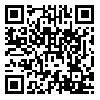المجلد 4، العدد 4 - ( 1444 )
المجلد 4 العدد 4 صفحات 105-126 |
الرجوع إلی قائمة المجلدات
Download citation:
BibTeX | RIS | EndNote | Medlars | ProCite | Reference Manager | RefWorks
Send citation to:



BibTeX | RIS | EndNote | Medlars | ProCite | Reference Manager | RefWorks
Send citation to:
Ghorbani E, arab A, Abad M. Sociological Analysis of Emotions Affecting Salient Identity Based on Stryker's Theory
(Case Study: The Protagonist in the Novel Vatan Men Zujaj (Homeland of the Glass))
. san 2022; 4 (4) :105-126
URL: http://san.khu.ac.ir/article-1-293-ar.html
URL: http://san.khu.ac.ir/article-1-293-ar.html
قربانی الهام، عرب عباس، آباد مرضیه. التحليل السوسيولوجي للأحاسيس المؤثرة على الهوية البارزة بناء علی نظرية سترايكر (البطل في رواية وطن الرجال زجاج: أنموذجاً). دراسات في السردانية العربية. 1444; 4 (4) :105-126
الهام قربانی1 
 ، عباس عرب*2
، عباس عرب*2 
 ، مرضیه آباد1
، مرضیه آباد1 


 ، عباس عرب*2
، عباس عرب*2 
 ، مرضیه آباد1
، مرضیه آباد1 

1- جامعة فردوسي مشهد
2- جامعة فردوسي مشهد ،darab@ferdowsi.um.ac.ir
2- جامعة فردوسي مشهد ،
الملخّص: (2479 المشاهدة)
|
مقالة علمية محكمة
|
قائمة المصادر
1. آزاد ارمکی، تقي (1381). نظریههای جامعهشناسی، طهران: سروش.
2. بن عبد الرزاق، لطیفة (2017). الهویة والانتماء في الروایة الجزائریة في التسعینات وطن من زجاج لـ یاسمینة صالح، رسالة الماجستير، جامعة محمد بوضیاف، المسیلة، الجزائر.
3. التوفیق، قحام (2017). أزمة الهویة فی الروایة الجزائریة المعاصرة،أطروحة الدکتوراه، جامعه محمد لین دباغین، سطیف، الجزائر.
4. حاجیانی، ابراهیم (1387). بررسی منابع هویت ایرانی، أطروحه لنیل شهادة دکتورا في السوسيولوجية، جامعة طهران، طهران.
5. حسایني لیلة؛ شعلال، نادیة (2014). المثقف و العنف في روایة وطن من زجاج لیاسمینة صالح، رسالة الماجستير، جامعة عبد الرحمان میرة، بجایة، الجزائر.
6. خاتمه، عقون؛ عمریة، ذیب (2018). محنة الکتابة التسعینیة دراسة فنیة للروایة الجزائریة التسعینیة، روایة الغیث لمحمد ساری، رسالة ماجستیر، جامعة الدکتور مولاي طاهر، سعیدة، الجزائر.
7. داوري، زهره؛ حبیبي، علي اصغر؛ عرب یوسف آبادي، عبدالباسط (2022). التحليل النفسي للشخصية الخاضعة في رواية بين القصرين؛ شخصية أمينة نموذجاً (على أساس نظرية كارین هورني)، مجلة دراسات في السردانیة العربیة، 4 (1):31-52
8. زکي، محمد علي (1382). ساخت و اعتبار يابی مقياس عوامل جامعه¬پذيری و بررسی تأثير آن بر شكل¬گيری هويت دانش¬آموزان، مشهد مجلة علوم تربيتی وروانشناسی، المجلد 4، العدد 2، صص، 281-306.
9. سکوت، جون (2009). مفاهیم اساسیة فی العلم الإجتماع، ط 1، بیروت: الشبکة العربیة للابحاث والنشر.
10. صالح، یاسمینة (2006). وطن من زجاج، ط 1، الجزایر: الدار العربیة للعلوم، ناشرون.
11. العیفة، نور الهدی؛ بوشلاق، عبد العزیز (2019). الشخصية الرئیسیة في روایة وطن من زجاج لیاسمینة صالح، مجلة علوم اللغة العربیة وآدابها: المجلد 12، العدد1، صص 784- 793. [DOI:10.37136/1003-019-002-005]
12. مهتدي، حسین؛ جابر، ردینة؛ أبوجهجه، خلیل (2022). أثر طفولة البطل والعلاقات الأسريّة في سلوكه في رواية «نهاية رجل شجاع» للکاتب السّوريّ حنّا مینه دراسة نفسیّة تحلیلیّة، مجلة دراسات في السردانیة العربیة، 4 (1):177-201
13. نعیمی، محمدرضا و دادمند، افسانه و حامدی، راضیه، (1399).« ترکیب تئوری هویت و تئوری کنترل هویت؛ طرحی نو در مفهوم سبزی هویت»، الملتقی السابع للدراسات الجديدة في العلوم الإنسانية، الإدارة و ريادة الأعمال، طهران.
14. https://civilica.com/doc/1028239
15. Stets, Jane, (2005). Examining Emotions in Identity Theory, Social Psychology Quarterly, Vol. 68, No. 1, 39-74. Pelling, E. L. & White, K. M. (2009). The theory of planned behavior applied to young people's use of social networking websites. Cyberpsychology & Behavior, 12(6), 755-759. Doi: 10.1089/cpb.2009.0109 [DOI:10.1089/cpb.2009.0109]
16. Stets, Jane, (2006). Identity theory & emotions. In: Handbooks of the Sociology of Emotions. Edited by Stets, Jan E & Jonathan H Turner. New York. Springer Science + Business Media, LLC. [DOI:10.1007/978-0-387-30715-2]
17. Stryker Sheldon (2004) "INTEGRATING EMOTION INTO IDENTITY THEORY", "Theory and Research on Human Emotions" Advances in Group Processes, Volume 21,1-23 [DOI:10.1016/S0882-6145(04)21001-3]
18. Stryker, S. & Burke, P. (2000). "The past, present, and future of an identity theory". Social Psychology Quarterly, 63(4), 284-297. [DOI:10.2307/2695840]
19. Al-Aifa, Nour Al-Huda, Bushlak, Abdel Aziz, (2019) The main character in the novel Watn Men Zjaj (A Homeland of Glass) by Yasmina Saleh, Journal of Arabic Language Sciences and Literature, Volume 12, Issue 1, p. 784- 793. ]In Arabic[
20. Al-Tawfiq, Qahham (2017) "The Identity Crisis in the Contemporary Algerian Novel", a doctoral thesis, Mohamed Lin Debaghin University, Setif, Algeria. ]In Arabic[
21. Azad Armaki, T. (2001). Sociological theories. Tehran: Soroush. ]In Persian[
22. Bin Abdul Razzaq, Latifa (2017). "Identity and Belonging in the Algerian Novel in the Nineties: A Homeland of Glass by Yasmina Saleh." Master's Thesis. Mohamed Boudiaf University. Al-Masila. Algeria. ]In Arabic[
23. Davari, Zahra, Habibi, Ali Asghar, Arab Yousefabadi, Abdel Basset, (2022). "Psychological analysis of the character of toward people in the novel by Bin al -Qasserin (Palace Walk): A case study of "Amina)." Khwarazmi University: Studies in Arabic Narrative. Year 4, Issue 7, pp. 31-52. ]In Arabic[
24. Hajiani, E. (1387). Investigation of the origin of Iranian identity. Doctoral dissertation in sociology. University of Tehran, Tehran. ]In Persian[
25. Hassaini Laila, Shaalal, Nadia, (2014), "The Intellectual and Violence in the Novel Watn Men Zjaj (A Homeland of Glass) by Yasmina Saleh," a memorandum submitted to complete the master's degree, Abderrahmane Mira University, Bejaia, Algeria. ]In Arabic[
26. Khatima, Aqoun, Omaria, Deeb, (2018) "The Tribulation of Writing in the Nineties, an Artistic Study of the Algerian Novel of the Nineties, the Novel of the Night by Mohamed Sari," Dr. Moulay Taher University, Saida, Algeria. ]In Arabic[
27. Mohtadi H, Jaber R, boujahjah K. Mufid al-Wahsh's Childhood and Family Relations Impact on His Behavior: A Psychological Studysan 2022; 4 (1):177-201. ]In Arabic[
28. Naimi, M. R. Dadmand, A. Hamedi, R. (2020). Combination of identity theory and identity control theory: A new plan in the concept of greenness of identity. The 7th national conference of modern studies and research in the field of humanities, management and entrepreneurship of Iran, Tehran, https://civilica.com/doc/ 1028239. ]In Persian[
29. Saleh, Yasmina, (2006 AD), Watn Men Zjaj (A Homeland of Glass), 1st edition, Al-Jazair: Arab House of Sciences - Publishers. ]In Arabic[
30. Scott, John, (2009), Basic Concepts in Social Science, 1st edition, Beirut: Arab Network for Research and Publishing. ]In Arabic[
31. Stets, Jane, (2005). Examining Emotions in Identity Theory, Social Psychology Quarterly, Vol. 68, No. 1, 39-74. Pelling, E. L. & White, K. M. (2009). The theory of planned behavior applied to young people's use of social networking websites. Cyberpsychology & Behavior, 12(6), 755-759. Doi: 10.1089/cpb.2009.0109 [DOI:10.1089/cpb.2009.0109]
32. Stets, Jane, (2006). Identity theory & emotions. In: Handbooks of the Sociology of Emotions. Edited by Stets, Jan E & Jonathan H Turner. New York. Springer Science + Business Media, LLC. [DOI:10.1007/978-0-387-30715-2]
33. Stryker Sheldon (2004) "INTEGRATING EMOTION INTO IDENTITY THEORY", "Theory and Research on Human Emotions" Advances in Group Processes, Volume 21,1-23 [DOI:10.1016/S0882-6145(04)21001-3]
34. Stryker, S. & Burke, P. (2000). "The past, present, and future of an identity theory". Social Psychology Quarterly, 63(4), 284-297. [DOI:10.2307/2695840]
35. Zaki, M. A. (2012). Construction and validation of the scale of sociability factors and studying its effect on the formation of students' identity. Journal of Educational Sciences and Psychology of Mashhad University, 4(2), 281-306. ]In Persian[
إرسال رسالة إلى المؤلف المسؤول
| Rights and permissions | |
 |
This work is licensed under a Creative Commons Attribution-NonCommercial 4.0 International License. |




.png)



